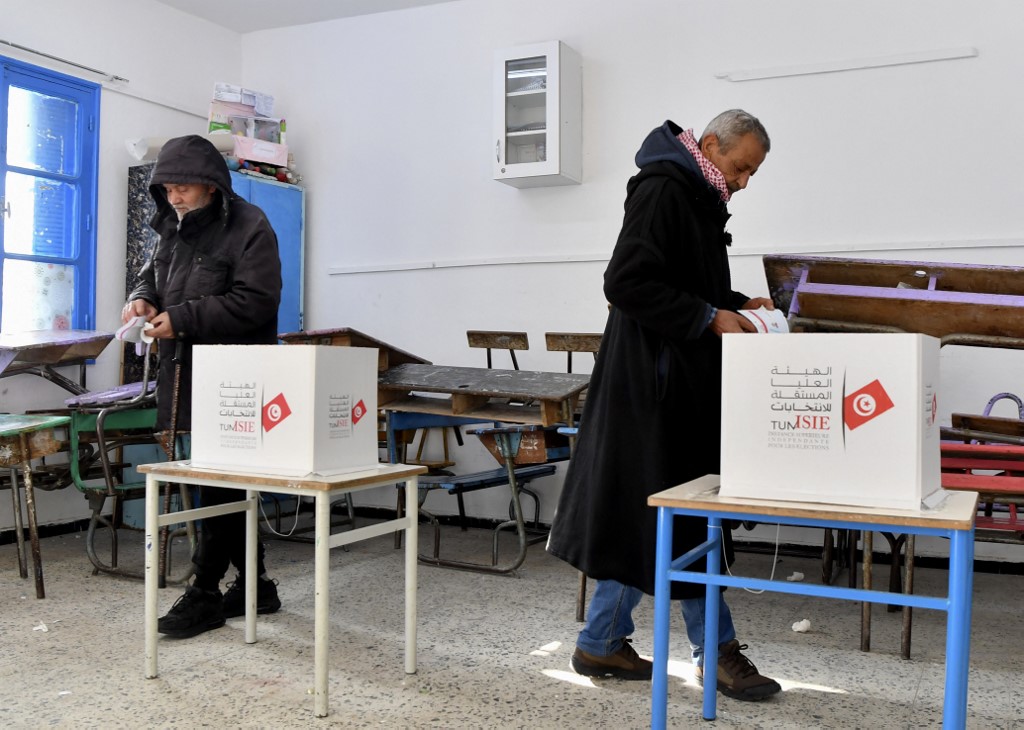Tunisia elections: The latest step on Kais Saied's road to failure

In the second round of Tunisia’s parliamentary elections last month, turnout was recorded at a historic low of 11 percent, spurring many commentators to assert that President Kais Saied has lost his legitimacy. Yet, while the last election was a referendum of sorts on Saied’s political “reforms”, it was ultimately just the latest step on his long road to failure since his July 2021 coup.
Saied’s legitimacy initially came into question when he suspended parliament, sacked the prime minister and appointed himself general prosecutor. Despite using Article 80 of the constitution to justify his coup, he has acted in contravention of the constitution throughout this process.
If Saied really wants to give power to the people, he should listen to their silence on voting days
In addition, Saied could not achieve the very goal he cited as the reason for these “reforms” - namely, giving power to the “people”. He consolidated all sorts of powers in his own hands: executive, legislative and judicial.
At the same time, he refused to listen to the majority of Tunisians, who have spoken through boycotts on several occasions, including the latest parliamentary election and last summer’s referendum on the new constitution, which saw a 30.5 percent turnout.
If Saied really wants to give power to the people, he should listen to their silence on voting days, which suggests they are not on the same page as him.
Stay informed with MEE's newsletters
Sign up to get the latest alerts, insights and analysis, starting with Turkey Unpacked
One could argue that Saied had popular support just prior to the coup. Although many Tunisians had lost trust in their country’s political parties, which failed to deliver in the transitional period following the 2010-11 revolution, polls showed he had widespread backing. But in light of the events of the past two years, the current public mood can only be measured through a transparent vote, which has not happened.
Economic dangers
Saied has also failed on the economic front. While he has stated that his “reforms” were meant to address the economic problems threatening the country’s future - including the fallout of the Covid-19 pandemic, which pushed protesters into the streets - the situation has actually worsened since Saied’s power grab.
According to a summer 2022 report from the World Bank, “with a projected growth rate of 2.7 percent, [Tunisia’s] economy appears to be on a slightly lower growth path than previously expected”. The report highlights the need for reforms to tackle rising commodity prices. At the same time, public debt has risen from 40.7 percent of GDP in 2010 to 84.5 percent in 2021, while the trade deficit widened by 61 percent in the first eight months of 2022, reaching 11.6 percent of GDP. Unemployment hovers around 15 percent.
The economic crisis pushed the Tunisian government to request a loan from the International Monetary Fund, and they reached a preliminary agreement last October, to the tune of $1.9bn. But in December, the IMF postponed a board meeting on the loan programme “to give the authorities more time to finalise it”, according to a Reuters report.
Meanwhile, rising inflation presents the clearest indication of the economic crisis under Saied’s rule. The country’s annual inflation rate has exceeded 10 percent - its highest since 1984 - as the severe financial crisis has led to shortages of basic food.
Fighting corruption?
In announcing his coup, Saied asserted that he would fight corruption, but nearly two years later, he has failed to prosecute corrupt businessmen and politicians. Rather, he has appeared to target only his political opponents, including former Prime Minister Ali Larayedh of the Ennahda party.
This week, Saied launched a new crackdown on activists, businessmen, and politicians using vague accusations of conspiracy against state security. The arrests include until now: influential businessman Kamel Eltaief; Abdelhamid Jelassi, a former senior leader of Ennahdha; political activist Khayam Turki; and two judges who were sacked previously by Saied. The arrest sparked a wave of critics and concerns from the UN rights chief and human rights groups.
One of Saied’s stated reasons for assuming one-man rule was to achieve “stability”. He even used the term “civil war” during talks with US Secretary of State Antony Blinken this past December, noting that Tunisia “was on the brink of civil war all over the country, so I had no other alternative but to save the Tunisian nation from undertaking any nasty action”.
No doubt, the country faced significant instability after the revolution - but this is an expected price for any transitional period from dictatorship to democracy. Saied has failed to unite the country, and instead, he has increased divisions by demonising political parties and coming into conflict with the powerful Tunisian General Labour Union, which has accused him of inciting a “war” on organised labour.
Indeed, the Tunisian president lost his legitimacy long before the last parliamentary elections. He has failed in his stated goals to improve the economy, unify the nation, fight corruption and listen to the people. He lost his legitimacy the very day he launched his coup.
The views expressed in this article belong to the author and do not necessarily reflect the editorial policy of Middle East Eye.
Middle East Eye delivers independent and unrivalled coverage and analysis of the Middle East, North Africa and beyond. To learn more about republishing this content and the associated fees, please fill out this form. More about MEE can be found here.






